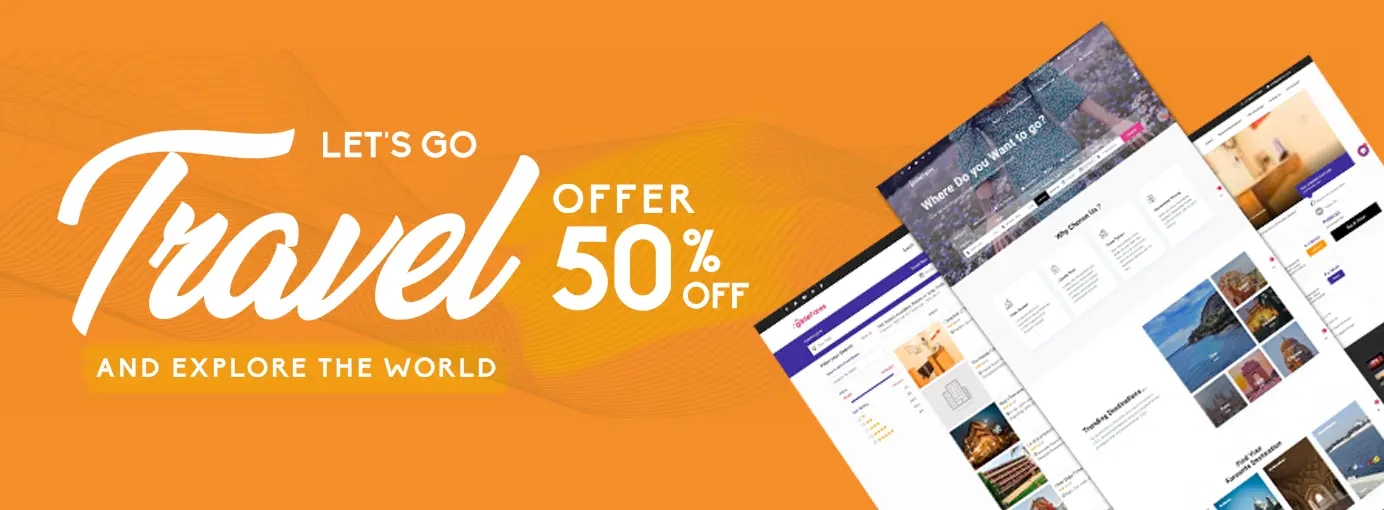Ready to go-LIVE travel solutions that helps your travel agency to sell a range of travel services pretty instantly. adivaha® travel solutions make sure you have no boundation over your imagination, you can do everything online, without the need for any technical knowledge or design skills. Easy Backoffice, extensive reporting with integrated Funds Management System.
Custom Travel Web Portals for Online Bookings

With the
rapidly evolving digital age of today, the tourism sector is drastically
changing. Conventional ways of planning and travel booking engine are being superseded by
dynamic, easy-to-use travel web portals. The latter present end-to-end solutions, consolidating diverse services such as flight reservations, hotel bookings , car rentals, and tour packages under one easy-to-use interface. For tourism companies wanting to remain competitive and cater to changing customer needs, learning about and utilizing travel web portals is no longer desirable—it's necessary.
Understanding Travel Web Portals: The Backbone of Modern Travel Solutions
A best travel portal is a series of web pages on the internet that consolidates and displays travel-related content and services in front of end-users. Such portals allow customers to look up, compare, and book travel-related services, such as flights, lodging, and transportation, as well as activities, through one website. In essence, travel portals provide a centralized travel planning entity, thereby improving user convenience and minimizing booking steps.
Major Features of Successful Travel Web Portals That Improve User Experience and Drive Bookings
Successful travel web portals provide real-time search, hassle-free booking, mobile-friendliness, safe payments, personalization, and API integration—guaranteeing improved user experience, operational effectiveness, and increased customer conversions.
Detailed Search and Booking Functionality
A good travel portal must have strong search features so that users can filter possibilities according to different parameters like price, location, dates, and personal preferences. Built-in booking engines facilitate real-time booking of flights, accommodations, and other services.
User-Friendly Interface and Navigation
A simple and intuitive interface ensures that the users are able to navigate the portal effortlessly, locate appropriate information, and make bookings without frustration or confusion.
Mobile Responsiveness
As smartphones increasingly become the platforms of choice for planning travel, portals have to be mobile-friendly and work smoothly on all screen sizes.
Secure Payment Gateways
The inclusion of secure and reliable payment solutions is imperative if one needs to gain customer confidence and enable smooth transactions.
Personalized User Experience
The use of user data to provide tailored recommendations, offers, and content is capable of significantly improving user engagement and satisfaction.
Multi-Language and Multi-Currency Support
To serve an international audience, portals must be multi-language and multi-currency capable, offering localized experiences to different user populations.
Integration with Third-Party APIs
The integration of airline, hotel, and other service providers' APIs enables real-time updates of data and increased service offerings.
Benefits of Travel Web Portal Implementation for Travel Businesses and Their Customers
Travel web portals make booking easier, enhance customer experience, increase market reach, yield real-time information, eliminate manual effort, and deliver insightful information—enabling travel businesses and extending convenience to their customers.
Improved Customer Convenience
Portals provide one-stop access to all travel needs, cutting down time and effort needed to plan and book journeys
Greater Operational Efficiency
Booking processes and customer interaction can be automated, reducing manual work, enabling businesses to concentrate on strategic expansion.
Wider Market Coverage
Being online allows travel companies to reach out to more people, including overseas customers, increasing their potential market.
Live Updates and Availability
Involvement with service providers guarantees that users are aware of the most up-to-date availability, price, and timetables data.
Data Gathering and Analysis
Websites can gather useful user data, which can offer insights into how and what customers want, facilitating marketing and service planning.
Competitive Edge
Providing an extensive, easy-to-use platform will make a company stand apart from the competition, drawing more customers and keeping them.
Best Practices to Create and Sustain a Successful Travel Web Portal That Delivers User Expectations
Creating a successful travel web portal needs intuitive design, search engine optimization, secure payments, mobile friendliness, API integration, and frequent content updates to satisfy user expectations and provide long-term performance and development.
Put User Experience (UX) Design First
Emphasize developing an intuitive, interactive interface that makes navigation easier and user satisfaction higher.
Maintain Scalability and Flexibility
Make the portal scalable and flexible enough to support growth and comply with evolving market needs, adding new services and features as necessary.
Use Strong Security Features
Secure user information and transactions using advanced security features, such as SSL encryption and secure payment systems.
Optimize for Search Engines (SEO)
Use relevant keywords, Meta tags, and good-quality content to enhance visibility and drive organic traffic.
Integrate Customer Support Features
Offer various customer support features like live chat, email support, and detailed FAQs.
Regularly Update Content and Offerings
Keep the portal updated and current by regularly changing travel offers, blog content, and service details.
Successful Travel Web Portals and Their Impact on the Travel Industry
Case histories of leading travel internet portals such as Expedia and Booking.com demonstrate the impact of intuitive design, live integration, and heterogeneous content on customer behavior and how these companies have raised industry standards for success.
Expedia
Expedia's extensive platform provides a full array of travel-related services, such as flights api, hotels api, car rentals, and vacation packages. With its intuitive interface and vast inventory, it has emerged as one of the leading companies in the online travel sector.
Booking.com
Most recognized for its extensive range of accommodations, Booking.com offers users thorough information, reviews, and competitive rates, making the booking process better.
TripAdvisor
TripAdvisor
merges travel reservations with user opinions and scores, giving travelers
knowledge and suggestions to help them make an informed choice.
Best travel websites have become an essential tool for contemporary travel
businesses, providing optimized services, improved customer experience, and
wider market reach. With a grasp of their features, advantages, and best
practices, travel businesses can use them to drive growth and stay ahead in the
dynamic digital environment.
